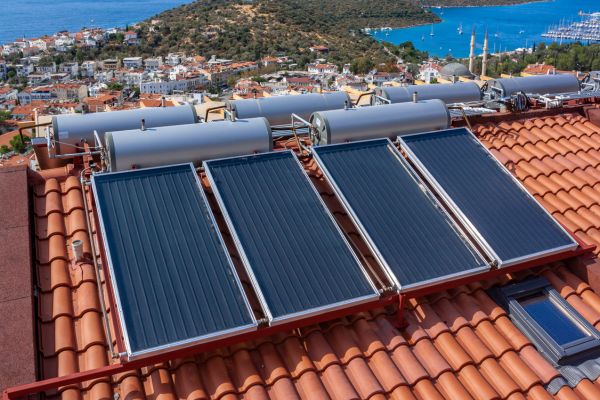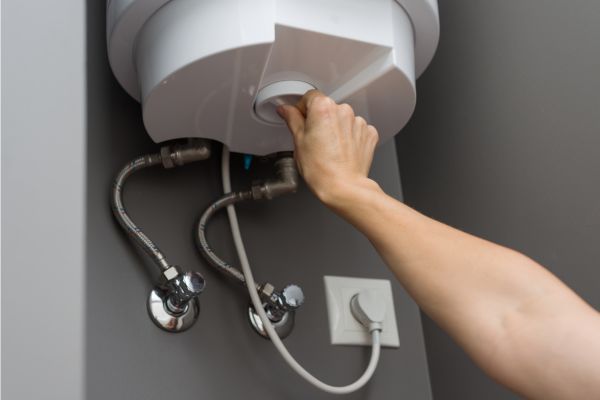With rising energy costs and a global push toward sustainability, homeowners are rethinking their choices for heating water. Conventional geysers consume large amounts of electricity or gas, leading to higher utility bills and carbon emissions. Solar water heaters provide a sustainable, cost-effective, and long-term solution. Here’s why more homeowners are making the switch.

Rising Energy Costs and Savings with Solar Water Heaters
Traditional water heaters account for a significant portion of household energy consumption. According to the U.S. Department of Energy, heating water makes up about 18% of a home’s total energy use. As electricity and gas prices continue to rise, homeowners are looking for alternatives to cut costs.
Solar water heaters use sunlight to heat water, drastically reducing reliance on external energy sources. While the initial investment may be higher than a conventional geyser, the long-term savings on electricity bills make it a worthwhile investment. Studies suggest that solar water heaters can reduce water heating costs by 50% to 80%, depending on location and usage patterns.
Environmental Benefits of Solar Water Heaters
Switching to a solar water heater is one of the most impactful ways homeowners can reduce their carbon footprint. Conventional geysers rely on fossil fuels or electricity, contributing to greenhouse gas emissions. According to the International Energy Agency (IEA), water heating accounts for nearly 4% of global CO₂ emissions.
Solar water heaters, however, produce zero emissions during operation. A typical solar water heater can offset 1.5 to 2.0 tons of CO₂ per year, which is equivalent to planting about 50 trees annually. This makes them an excellent choice for environmentally conscious homeowners.
Benefits of Solar Water Heaters for Homeowners
Switching to a solar water heater is more than just an eco-friendly choice—it comes with a range of practical benefits that directly impact a homeowner’s finances, comfort, and energy security. From cutting energy costs to increasing property value, here’s why more homeowners are opting for solar-powered water heating solutions.
Lower Energy Bills
Heating water accounts for a significant portion of household energy consumption, often ranking as the second-largest energy expense after heating and cooling. Solar water heaters can reduce water heating costs by up to 80%, depending on location and usage. Unlike conventional electric or gas water heaters, which rely on non-renewable energy sources, solar water heaters use freely available sunlight. This translates into substantial savings over the system’s lifespan, helping homeowners recover their initial investment within a few years.
Long Lifespan and Durability
One of the biggest advantages of solar water heaters is their longevity. Conventional water heaters typically last 8 to 12 years, whereas solar water heating systems have a lifespan of 20 to 25 years with proper maintenance.
Since solar heaters have fewer moving parts and are built with durable materials like corrosion-resistant tanks and high-quality solar collectors, they experience fewer breakdowns and require minimal maintenance. This makes them a reliable and cost-effective solution for long-term hot water needs.

Independence from Power Outages
For homeowners in regions where power outages are frequent, solar water heaters offer a crucial advantage. Traditional electric geysers become non-functional during blackouts, leaving households without hot water. Solar water heaters, however, continue to operate as long as there is sunlight, ensuring a consistent supply of hot water. In some cases, solar systems are equipped with backup heating elements, which can be powered by batteries or auxiliary energy sources, further enhancing reliability.
Increased Home Value
Installing energy-efficient appliances can make a property more attractive to buyers, and solar water heaters are no exception. Studies indicate that homes with renewable energy systems sell 4% to 6% faster and at a higher price than homes without them. Prospective buyers are increasingly considering sustainability and energy savings when purchasing a home, making solar water heating a valuable investment that not only reduces monthly utility bills but also boosts resale value.
Reduced Carbon Footprint
Conventional water heaters rely on fossil fuels, contributing to greenhouse gas emissions and environmental degradation. Water heating alone accounts for nearly 4% of global CO₂ emissions, according to the International Energy Agency (IEA). By switching to a solar water heater, homeowners can significantly lower their household’s carbon footprint. A single solar water heating system can offset 1.5 to 2.0 tons of CO₂ per year, which is equivalent to planting around 50 trees annually. This makes solar water heaters a simple yet effective way for individuals to contribute to a cleaner and more sustainable future.
Low Maintenance and Operating Costs
Unlike conventional water heaters that require frequent servicing and component replacements, solar water heaters have low maintenance requirements. Most systems need a basic inspection and cleaning of solar panels once or twice a year to maintain efficiency. Since sunlight is a free and renewable resource, operating costs remain minimal. Additionally, modern solar water heaters are designed with self-cleaning technology, reducing the buildup of sediments and scaling, which commonly affect traditional water heaters.

Protection Against Energy Price Volatility
With global energy prices fluctuating due to market conditions and geopolitical factors, reliance on traditional electricity and gas-powered water heaters can lead to unpredictable costs. Solar water heaters, however, offer long-term price stability. Since they primarily depend on sunlight, homeowners are insulated from rising electricity or gas rates, making their household energy expenses more predictable and manageable over time.
Government Incentives and Subsidies for Solar Water Heaters
Governments worldwide are encouraging homeowners to switch to solar water heaters through various incentives and subsidies. Many countries offer tax credits, rebates, or low-interest loans for installing solar water heaters.
For example:
- In the United States, homeowners can receive a 30% federal tax credit on the cost of a solar water heater
- In India, the government offers subsidies of up to 30-40% for residential solar water heater installations
- The European Union provides various grants supporting solar adoption, helping reduce upfront costs.
These incentives make solar water heaters an even more attractive investment, encouraging more homeowners to make the switch.
How Solar Water Heaters Reduce Dependence on the Grid
By harnessing the power of the sun, solar water heaters help homeowners become less dependent on external energy sources. This is particularly beneficial in regions where electricity shortages or high tariffs are common.
Since solar energy is free and abundant, homeowners can enjoy hot water even during power outages, giving them greater control over their energy usage. This independence also protects households from unpredictable energy price hikes, providing long-term financial stability.
Advancements in Solar Water Heating Technology
Solar water heaters have evolved significantly, with new innovations improving efficiency and reliability. Some of the latest advancements include:
- Vacuum tube collectors that enhance heat retention and performance, even on cloudy days
- Hybrid solar water heaters that integrate high-efficiency heat pumps to optimize energy use
- Smart and AI-powered solar water heating systems that use sensors to track energy consumption and optimize heating schedules
These improvements make solar water heaters more efficient, user-friendly, and reliable than ever before.
The Future of Solar Water Heaters: Smart and AI-Integrated Systems
The future of solar water heaters is becoming even more exciting with the integration of smart technology and AI-driven systems. New solar water heaters come with WiFi-enabled monitoring, allowing homeowners to track energy usage and optimize heating times through mobile apps.
AI-powered systems can predict hot water demand based on usage patterns, ensuring efficiency while minimizing waste. These innovations are making solar water heaters an even more intelligent and convenient choice for modern homes.
Solar Water Heaters are Sustainable Alternative
As energy costs rise and environmental concerns grow, homeowners are actively seeking sustainable alternatives. Solar water heaters offer a cost-effective, eco-friendly, and long-lasting solution compared to conventional geysers. With government incentives, lower maintenance costs, and advancements in smart technology, solar water heating is no longer just an option—it’s the future of home energy solutions.
For those looking to reduce expenses, lower their carbon footprint, and increase home value, making the switch to a solar water heater is a decision that pays off in more ways than one.



